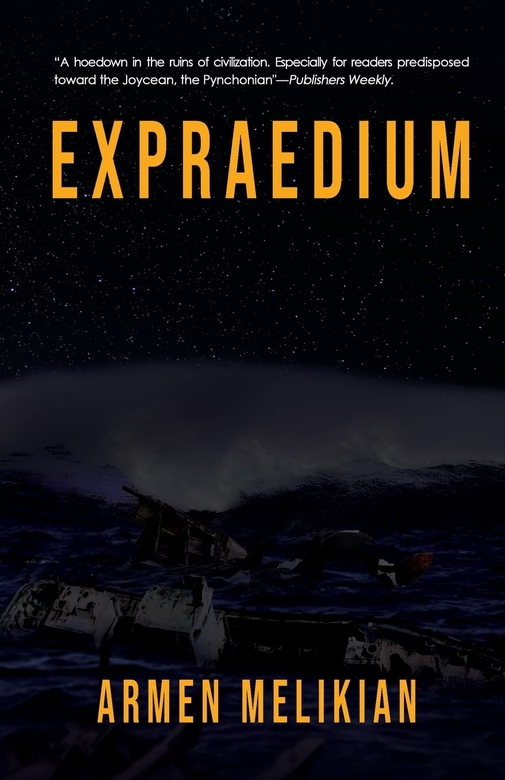
Defying structure, narrative decorum, and often logical thought itself, Expraedium by Armen Melikian is a hero’s journey like no other, a radical adventure of reinvention, leading to a reframing of language and the very nature of storytelling.
In search of Urmashu, a legendary republic of immortals, Brathki embarks on a surreal quest, without apparent destination or clear purpose, baffling the reader as much as the protagonist, as the narrative plays with the boundaries of reality and time. Melikian’s writing blurs prose, poetry, and inscrutable languages of sign and symbol, and if bold readers can decipher the paradoxical gymnastics of this manuscript, they may be granted access to something magical, as if the author is inventing an esoteric language that holds transcendent secrets inside.
Like a primal prophet, Melikian’s writing is reminiscent of other complex minds, from William S. Burroughs and Thomas Pynchon to James Joyce and David Foster Wallace, but there is something radically unique in this novel’s peculiar style, giving a sense that the author is onto something profound if you’re adept enough to pick it apart; in other words, there may just be a method to the madness.
However, despite the reader’s inherent desire to find the buried treasure in such a quixotic text, one must be prepared to allow certain passages to remain nebulous puzzle pieces: “The cord umbilical eter mamma and son. Unsevered. Unto death lead the twain an eln symbiotic, a rumba parasitica engaging mutually. Rite sacred. To oppose it, the caedem per accensionem of the bride.” As though Dante Alighieri had been a Dadaist, the sacrilegious, spiritual, and farcical blend together, resulting in a melange of confusing tangents and poetic interjections.
Throwing down the gauntlet to ambitious readers who can parse meaning from writing that can seem close to gibberish, this journey is not for the faint of mind, nor the easily perplexed. Aside from the structural challenges, there is also a wealth of outmoded and rarely used bits of vocabulary that will send diligent readers to their dictionary every page or two, often to find that their query is not actually a word in the English language. At other times, the prose explodes in a kaleidoscope of experimental language, multilayered meaning, and profound moments of lucidity, which one hopes take firmer hold, before the narrative shifts back into the next quagmire of head-scratching descriptions.
Given the author seems disinterested in traditional form when it comes to technical execution, syntax, story form, language shifts, flow, or even spelling, as we currently understand it, a technical critique feels superfluous, and without a Rosetta stone for the prose, it can even be hard to parse the story. That being said, similar to the experience of reading the densest stanzas of Shakespeare or Anthony Burgess’ A Clockwork Orange, one does fall into a rhythm of something approaching understanding, despite the occasional comprehension gaps of nonsensical or esoteric words.
Traveling to the furthest reaches of post-modern experimental fiction, and requiring determination, patience, and even perhaps a level of genius to completely understand, this gleefully labyrinthine tome is decidedly unlike anything that has been written before, displaying at every turn its creative ingenuity and intensive ambition.
Book Links
STAR RATING
Design
Content
Editing
Get an Editorial Review | Get Amazon Sales & Reviews | Get Edited | Get Beta Readers | Enter the SPR Book Awards | Other Marketing Services























Leave A Comment